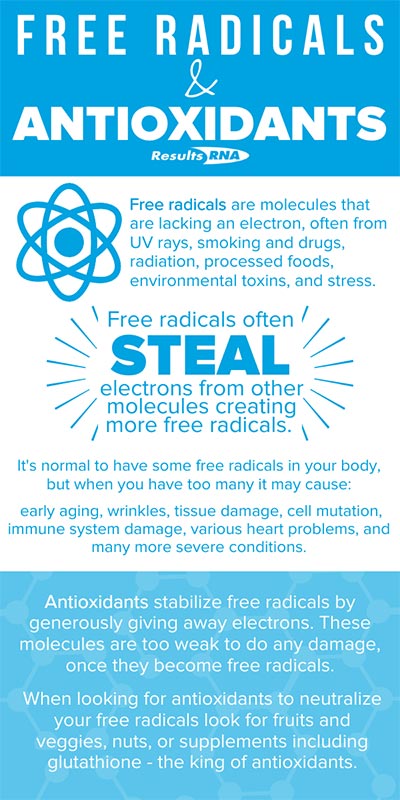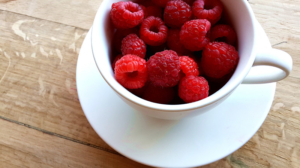
What are Free Radicals?
Free radicals are atoms within the body that are missing electrons in their outer shell. Because of this, these atoms are not stable and are highly reactive. These atoms move through the body stealing electrons from other atoms, spreading instability as they go. According to the free radical theory of aging, free radicals will break cells down over time.
What is Oxidative Stress?
Oxidative stress occurs when there are more free radicals in the body than antioxidants can neutralize. Over time, oxidative stress can lead to a myriad of health issues including chronic inflammation. As the body matures and ages, it loses its ability to fight the effects of free radicals. The result is more free radicals, more oxidative stress, increased cellular degeneration and premature aging.
Symptoms of oxidative stress include:
- Fatigue
- Inflammatory conditions
- Respiratory problems
- Hardening of blood vessels
- Decreased eyesight
- Wrinkles
- Grey Hair
- Headaches
- Sensitivity to noise
- Memory loss
- Brain fog
Antioxidants Reduce Oxidative Stress
Antioxidants are molecules within the body that carry extra electrons. Antioxidants like glutathione provide extra electrons to free radicals. Free radicals are then neutralized and no longer cause oxidative stress. Reducing oxidative stress daily is the key to aging gracefully and retaining optimal health.
Glutathione: The King of Antioxidants

Glutathione is known as the king of antioxidants. Glutathione, or GSH, is one of the most critical molecules of the entire body. This antioxidant can be found in every cell of the human body. Glutathione is made up of three amino acids – glutamate, glycine, and cysteine. The liver is the primary reservoir for glutathione and its potent antioxidant activity is essential for the liver’s role in detoxifying harmful compounds that enter our body.
Glutathione plays an important role in antioxidant defense, nutrient metabolism, and is key in a vast number of cellular processes. These processes include gene expression, DNA and protein synthesis, cell proliferation and apoptosis, signal transduction, cytokine production, immune response, and protein glutathionylation.
As the most important intracellular antioxidant, GSH regulates all other antioxidants while preventing damage to important cellular components caused by reactive oxygen species, such as free radicals and peroxides.
Glutathione is by far the most important and effective antioxidant. Low glutathione levels are linked to premature aging, exhaustion and poor overall health. Put simply, glutathione improves quality of life.
Making sure our bodies have adequate glutathione levels is essential. So where can we get additional glutathione? We can increase glutathione levels through proper diet and effective glutathione supplementation.
Foods that can Help Raise Glutathione Levels
Glutathione is a naturally occurring antioxidant that can be found in many foods, including:
- Cruciferous Vegetables
- Broccoli
- Cauliflower
- Brussels Sprouts
- Bok Choy
- Allium Vegetables
- Eggs
- Nuts
- Berries
- Grapes
- Sweet Potatoes
- Kale
- Legumes
- Lean Protein
- Whey
We may be able to glean small amounts of glutathione through food, but the digestive tract is hard on this tripeptide. Often, glutathione is destroyed by stomach acid before it ever reaches its destination. Therefore, we highly recommend adding a glutathione supplement to your daily regimen.
There are a few types of glutathione supplements on the market, but not all of them will raise your glutathione levels with equal efficacy.

 Antioxidants protect your cells against the harmful effects of free radicals that cause oxidative stress. Protecting your cells and reducing long term cell damage is key to achieving optimal health. Keeping your antioxidant levels high will raise your energy levels, improve clarity of thinking, aid in post-workout recovery, and much more.
Antioxidants protect your cells against the harmful effects of free radicals that cause oxidative stress. Protecting your cells and reducing long term cell damage is key to achieving optimal health. Keeping your antioxidant levels high will raise your energy levels, improve clarity of thinking, aid in post-workout recovery, and much more.





